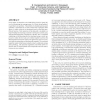Free Online Productivity Tools
i2Speak
i2Symbol
i2OCR
iTex2Img
iWeb2Print
iWeb2Shot
i2Type
iPdf2Split
iPdf2Merge
i2Bopomofo
i2Arabic
i2Style
i2Image
i2PDF
iLatex2Rtf
Sci2ools
156
click to vote
CODES
2003
IEEE
2003
IEEE
A low power scheduler using game theory
In this paper, we describe a new methodology based on game theory for minimizing the average power of a circuit during scheduling in behavioral synthesis. The problem of scheduling in data-path synthesis is formulated as an auction based non-cooperative finite game, for which solutions are developed based on the Nash equilibrium function. Each operation in the data-path is modeled as a player bidding for executing an operation in the given control cycle, with the estimated power consumption as the bid. Also, a combined scheduling and binding algorithm is developed using a similar approach in which the two tasks are modeled together such that the Nash equilibrium function needs to be applied only once to accomplish both the scheduling and binding tasks together. The combined algorithm yields further power reduction due to additional savings during binding. The proposed algorithms yield better power reduction than ILP-based methods with comparable run times and no increase in area over...
CODES 2003 | Game Theory | Hardware-Software Codesign | Nash Equilibrium Function | Power Reduction |
Related Content
| Added | 04 Jul 2010 |
| Updated | 04 Jul 2010 |
| Type | Conference |
| Year | 2003 |
| Where | CODES |
| Authors | N. Ranganathan, Ashok K. Murugavel |
Comments (0)

